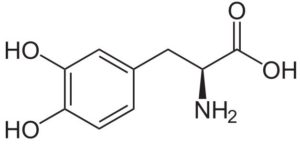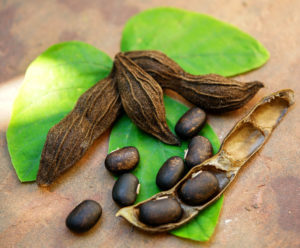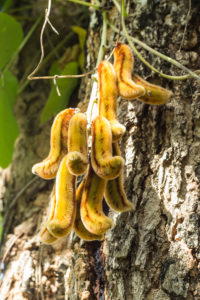Table of Contents
Key Takeaways
- L-DOPA is a vital amino acid precursor of neurotransmitters dopamine, epinephrine, and norepinephrine synthesized in the brain from l-tyrosine.
- Mucuna Pruriens is a natural source of L-DOPA, used as a nootropic to enhance brain function by increasing dopamine levels.
- L-DOPA from Mucuna Pruriens can improve memory, cognition, mood, and overall brain health while reducing stress and acting as an antidepressant.
- Opt for organic Mucuna Pruriens extract with higher L-DOPA concentrations (15% – 30%) to ensure better tolerance and efficacy, avoiding synthetic versions used for Parkinson’s treatment.
- Nootropic use of L-DOPA is generally safe and well-tolerated, but caution is necessary to avoid tolerance and dependence issues.
See my article on all of the supplements that have been shown to help with Parkinson’s here: Best Supplements for Parkinson’s Disease
L-DOPA (levodopa, L-3,4-dihydroxyphenylalanine) is an amino acid synthesized in your brain by the amino acid l-tyrosine. L-DOPA is a precursor of several neurotransmitters including dopamine, epinephrine, and norepinephrine.
Mucuna Pruriens contains naturally occurring L-DOPA in high concentrations. And is used as a nootropic because dopamine itself cannot cross the blood-brain barrier.
Dopamine and norepinephrine are essential for memory, cognition, and a positive mood. A lack of either of these neurotransmitters can lead to a lower mood state, loss of memory, brain fog, poor energy, and more. And if left unchecked will eventually result in neurodegenerative diseases like Parkinson’s.
L-DOPA helps:
- Brain Health. L-DOPA helps to increase growth hormone levels in the brain. Boosting the production of neurons and glia cells affecting the formation of memories, and overall brain health.
- Neurotransmitters. L-DOPA is a necessary precursor for your brain to make dopamine. And dopamine is then synthesized into the neurotransmitters epinephrine, and norepinephrine. Affecting cognition, learning, memory, movement, motivation and pleasure.
- Neuroprotection. L-DOPA produces neuromelanin which is similar to the melanin pigment in your skin. In your brain they absorb toxic quinones, and chelate heavy metals like mercury and lead.
What is L-DOPA (Mucuna Pruriens)?
L-DOPA (levodopa, L-3,4-dihydroxyphenylalanine) is an amino acid that’s naturally synthesized in your brain by the amino acid l-tyrosine.

L-DOPA is a necessary precursor to the synthesis of the neurotransmitter dopamine. Called a catecholamine, dopamine is then synthesized into the other catecholamines epinephrine (adrenaline) and norepinephrine (noradrenaline).
Unlike Dopamine, L-DOPA can cross the blood-brain barrier. This is why we supplement with L-DOPA rather than dopamine.

And for a dopamine boost, neurohackers use Mucuna Pruriens, which contains high levels of L-DOPA.[i] This legume, native to the tropical regions of India, Africa and the West Indies, and also known as velvet bean, has been used in Ayurveda medicine since 1500 B.C.
The ancients used Mucuna Pruriens to treat things like snakebite, intestinal problems, sexual issues, and a melancholy mood.
Raising levels of the neurotransmitter dopamine in your brain helps regulate mood and cognition.[ii]
Mucuna Pruriens vs. L-DOPA: What’s the Difference?
Mucuna Pruriens is an extract of the velvet bean plant that grows 3 – 18 meters in height. L-DOPA (levodopa) is usually synthetic and made in the lab.
The natural version of L-DOPA from Mucuna Pruriens is generally well-tolerated by most people. And the compounds in the plant are bio-identical to those chemicals naturally made in your body. Not so with synthetic L-DOPA.
Synthetic L-DOPA is metabolized into dopamine in your body by an enzyme called aromatic L-amino acid decarboxylase (AADC). And the majority of synthetic L-DOPA will be converted peripherally (not in the central nervous system and brain). This can cause problems.
So when used therapeutically, as in treating Parkinson’s Disease, L-DOPA is administered in combination with an inhibitor of peripheral AADC. Drugs like carbidopa (or other AADC inhibitors) ensure most of the L-DOPA is preserved for conversion to dopamine in the brain. And not the rest of your body.
This is critical for nootropic users to keep in mind. Chronic, or prolonged use of synthetic L-DOPA can lead to things like dyskinesia. This is a movement disorder where neurological discoordination results in uncontrollable, involuntary movements.[iii]
I am not telling you this to dissuade you from using L-DOPA. Stick with an extract of Mucuna Pruriens and you should be fine.
How does L-DOPA Work in the Brain?
L-DOPA boosts brain health and function in several ways. But two in particular stand out.
- L-DOPA improves memory. It’s metabolized into dopamine in your body by an enzyme called aromatic L-amino acid decarboxylase (AADC). This increases dopamine levels in your brain.
Researchers at the University of Münster in Germany conducted a study with 40 healthy people. In this randomized double-blind study, they gave one group 100 mg of levodopa daily for 5 days. The other group took a placebo.
90 minutes later on each day, subjects were given a memory test based on vocabulary. The study found that levodopa significantly enhanced the speed, overall success, and long-term retention of novel words.[iv]
- L-DOPA promotes brain health. Research suggests Mucuna Pruriens protects your brain by regulating cognitive and neural functions. And even encouraging neural activity.
Researchers in India showed that Mucuna Pruriens is a potent antioxidant. They performed assays to evaluate the enzymatic and nonenzymatic antioxidants in extracts. They found high levels of flavonoids, alkaloids, tannic acids, gallic acids, quercetin equivalents, and sitosterol equivalents.[v]
All of these compounds scavenge for free radical in your brain. Free radicals are formed during normal brain activity, like the synthesis of ATP that is produced in your mitochondria.
Your brain is equipped to eliminate some of these free radicals on its own. But especially in today’s environment in which we live, your brain is overwhelmed. Free radicals cause inflammation which damages and can kill brain cells. Affecting memory, learning, recall, cognition and mood.
Mucuna Pruriens has been proven to be a very effective brain inflammation fighter. It even has the ability to chelate heavy metals like mercury and lead in brain cells. And it’s antibacterial.[vi]
Mucuna Pruriens helps your brain make naturally occurring neuronal pigments called neuromelanin’s. They’re similar to the melanin found in your skin. And they’re often found in regions of your brain where dopamine is active.
The synthesis of neuromelanin’s in the various regions of your brain is an important protective process. The melanic component is generated through the removal of reactive/toxic quinones that would otherwise cause neurotoxicity.
This melanic component promoted by Mucuna Pruriens is what chelates and accumulates toxic, heavy metals like mercury and lead.[vii] Preventing them from damaging brain cells.
How things go bad when you have low dopamine
As we get older, our brain chemistry and energy metabolism changes.
↓ Dopaminergic neurons are damaged or die
↓ Dopamine levels decline
↑ Stress levels increase
↓ Long-term memory and mood decline
All of these age-related changes are contributing factors to the neurodegenerative diseases of aging, including Parkinson’s Disease.
L-DOPA benefits for brain health
Mucuna Pruriens natural herbal supplement extract contains high levels of L-DOPA, the precursor to the crucial neurotransmitter dopamine. Dopamine is further synthesized into the neurotransmitters epinephrine (adrenaline) and norepinephrine (noradrenaline).
Dopamine plays a critical role in learning and absorbing new information. Increasing brain levels of dopamine helps regulate mood and boosts cognition.
Research also suggests that Mucuna Pruriens provides antioxidants that defend against oxidative damage caused by free radicals.[viii]
How does L-DOPA feel?
Neurohackers report that using Mucuna Pruriens helps in multi-tasking, improving motivation, more focus, less stress, and a sense of calm.
You could find your energy levels increase, less brain fog, and a boost in overall mood. A more positive outlook on life. And an increase in libido.
L-DOPA Clinical Research
Mucuna Pruriens (L-DOPA) as an
alternative for Parkinson’s Disease
Researchers at the Parkinson’s Institute located at the University of Milan in Italy recruited 18 patients with advanced Parkinson’s Disease. The patients were given either ground Mucuna Pruriens powder (standardized 5.7% L-DOPA) or prescription form of levodopa containing a dopa-decarboxylase inhibitor. And then measured motor improvements at 60 and 90 minutes after using the supplement or drug.
The researchers found Mucuna Pruriens standardized powder produced reduced Parkinson’s symptoms equivalent to the prescription version of levodopa. But with significantly fewer problems with dyskinesias. The team concluded the “Clinical effects of high-dose Mucuna Pruriens were similar to levodopa alone at the same dose, with a more favorable tolerability profile“.
Mucuna Pruriens reduces stress
A study was conducted to assess the role of Mucuna Pruriens in infertile men. It was done at King George’s Medical University in Lucknow, India. The study included 60 men who were undergoing infertility screening. And no surprise here; were found to be suffering from stress.
The control group in this study were 60 age-matched men who had initiated at least one pregnancy. The infertile men were given 5 grams of Mucuna Pruriens seed powder per day for 3 months. Semen samples were collected at the beginning of the study. And after 3 months of treatment.
The researchers found that treatment with Mucuna Pruriens significantly decreased stress levels. And increased sperm count to the same level as the fertile control group of men.
They “concluded that M. pruriens not only reactivates the anti-oxidant defense system of infertile men but it also helps in the management of stress and improves semen quality.”[ix]
L-DOPA improves learning
This study in Germany was done with 40 healthy subjects. They were given 100 mg of L-DOPA or a placebo for 5 days in a randomized, double-blind trial.
Subjects were trained on artificial vocabulary using a high-frequency, repetitive approach. This was done 90 minutes after L-DOPA administration on each day of the trial.
The researchers found that L-DOPA significantly enhanced the speed, overall success, and long-term retention of the words.[x]
L-DOPA as an anti-depressant
Increasing dopamine in your brain also boosts your mood and libido. This study was done in India with mice. Researchers used the well-known Forced Swimming Test (FST), Tail Suspension Test (TST), and Chronic Unpredictable Mild Stress (CUMS) test.
The mice were fed Mucuna Pruriens seed extract, and then evaluated while performing, well… what mice do in the lab. The research team found that Mucuna Pruriens seed extract has significant antidepressant qualities. Which would simply verify what we already know in humans.[xi]
Using Mucuna Pruriens extract is a great anti-depressant.
L-DOPA Recommended Dosage
L-DOPA (Mucuna Pruriens extract) suggested dosage for cognitive benefits is 250 – 500 mg twice per day. Most Mucuna Pruriens extracts only contain 15 – 20% L-DOPA. So you may need to adjust your dose up or down depending on how you respond to this supplement.
You may also find that you need to cycle the use of L-DOPA (Mucuna Pruriens). And use it only 4 or 5 days a week. This can help avoid tolerances and dependencies (which are common with any dopamine agonist). DO NOT attempt to cycle this nootropic if you are using it to treat Parkinson’s Disease.
If you are using Mucuna Pruriens extract (L-DOPA) for Parkinson’s Disease you will likely need 500 – 1,000 mg Mucuna Pruriens 3 or more times per day. And look for a Mucuna Pruriens extract (98% L-DOPA).
See my article on all of the supplements that have been shown to help with Parkinson’s here: Best Supplements for Parkinson’s Disease
L-DOPA Side Effects
L-DOPA is produced naturally in your body. So is considered well-tolerated and safe. And L-DOPA from Mucuna Pruriens extract is particularly well tolerated by most people.
Research shows that the natural form of L-DOPA from Mucuna Pruriens compared to synthetic versions of L-DOPA provides similar results. But without the common side effects of nausea, vomiting, and involuntary muscle movement.[xii]
But be very careful when working with dopamine. Too much and you can experience symptoms like hair loss, auditory or visual hallucinations, psychosis, Dyskinesia and more.
Of course, if you begin to experience any of these side effects, stop supplementing with L-DOPA (Mucuna Pruriens) immediately.
Like any natural supplement, it’s always better to use an organic source.

Type of Mucuna Pruriens (L-DOPA) to buy
Mucuna Pruriens is typically available in powder, capsule or tablet form. Some are pure, dried Mucuna Pruriens powder.
Several manufacturers offer Mucuna Pruriens extracts ranging from 15% – 30% L-DOPA. Or they tell you how many mg of L-DOPA is in each capsule or tablet.
A few manufacturers call it “Velvet Bean Extract” or “Mucuna Extract” with the percentage of L-DOPA in each capsule or tablet. It’s the same as Mucuna Pruriens.
Try to find “organic” or “certified organic” if you can. And for Nootropic use, avoid synthetic L-DOPA which is typically used to treat Parkinson’s Disease.
Nootropics Expert Recommendation
L-DOPA (Mucuna Pruriens) dosage 250 – 500 mg twice per day
 I recommend using L-DOPA as a nootropic supplement.
I recommend using L-DOPA as a nootropic supplement.
Your body does synthesize some L-DOPA on its own. And converts it into the essential neurotransmitters dopamine, epinephrine, and norepinephrine.
But as you get older, dopamine receptors die or become unresponsive. Or your body doesn’t convert the necessary amino acids well enough to supply the neurotransmitters you need for an optimized brain.
L-DOPA is helpful to boost energy and motivation levels, memory, clear brain fog, improve mood and libido.
L-DOPA is especially helpful for those suffering from neurodegenerative diseases like Parkinson’s. And the natural form of L-DOPA from Mucuna Pruriens often offers better results with fewer side effects than prescription drugs.
I suggest starting with a dose of 100 – 250 mg twice daily for nootropic use at first. And you may find that you need to cycle L-DOPA. Use it for 4 or 5 days and take a break. Tolerance is often a problem when working with dopamine. As is dependence or addiction.
If you are using Mucuna Pruriens (L-DOPA) for Parkinson’s Disease, please see my article on all of the supplements that have been shown to help with Parkinson’s here: Best Supplements for Parkinson’s Disease









Join The Discussion - 413 comments
Nitin
February 17, 2022
Whats does it mean , Bacopa Monnieri likely caused anxiety because you are messing with dopamine.
David Tomen
February 18, 2022
Bacopa Monnieri acts like an MAOI which increases the release of dopamine, norepinephrine and epinephrine (adrenaline).
Nitin
February 17, 2022
Hello sir, how to repair and unblock dopamine receptors if it they are blocked and damaged by medicines .
David Tomen
February 18, 2022
Nitin, NAC has been shown to help restore dysfunctional dopamine receptors.
Nitin
March 11, 2022
Sir how long NAC must be taken to repair dysfunctional dopamine receptors.
David Tomen
March 11, 2022
Nitin, it will begin repairing dysfunctional dopamine receptors soon after you start using NAC. But it take a while to repair if there is a lot of damage. You should start to experience this within a couple of weeks if you are dosing 500 mg 3-times per day.
NITIN NITIMITIN
March 22, 2022
Nac is causing indigestion so can you tell me how to avoid it.
David Tomen
March 23, 2022
Try taking NAC with food. If that does not help then get a Ginger supplement like this one: https://amzn.to/3tzquO0.
If none of those ideas work then NAC may be the wrong supplement for you.
Ashley
January 16, 2022
Hi,
Should I split mucuna pruriens dose or I can take it all together? For example 200mg l-dopa? Or there’s no need to split a small dose like that?
David Tomen
January 16, 2022
Ashley, there is no need to split a dose that small.
Andrew
January 15, 2022
David,
Is it safe to combine L-Dopa mucuna pruriens with rhodiola rosea?
David Tomen
January 16, 2022
Andrew, it depends on how much you use because Rhodiola Rosea acts like an MAOI and it will potentiate L-DOPA.
Andrew
January 18, 2022
I used bacopa monnieri before. 400mg a day with 50% bacosides but I got huge anxiety from it after a few weeks of using.
I did some research and it’s possible that bacopa decreases dopamine levels. Is that true?
That’s why I bought mucuna to increase my dopamine levels as I thought maybe I’m lacking dopamine. I’m depressed, fatigued and I’m not gaining pleasureor interest from anything.
I started this week with 100mg l-dopa and 300mg rhodiola rosea. I’m not sure about rosavin and salidroside content as it’s not stated. I thought about upping the dose to 200mg l-dopa after a week.
Can I add bacopa with these two or it won’t be any good?
David Tomen
January 18, 2022
Andrew, Bacopa Monnieri potentiates and modulates monoamine oxidase in your brain (https://www.ncbi.nlm.nih.gov/labs/pmc/articles/PMC3746283/). Which means that it helps release and modulate the use of dopamine, norepinephrine and serotonin. It does not decrease dopamine.
Rhodiola Rosea affects monoamine oxidase as well so when you are using both you are doubling the MAOI effect.
Bacopa Monnieri likely caused anxiety because you are messing with dopamine and norepinephrine and it sounds like your brain does not appreciate that. So, instead of trying different ‘add-ons’ you should consider dropping Bacopa altogether. Because it may be the wrong supplement for you.
Andrew
January 24, 2022
Is it necessary to take b group vitamins witth mucuna pruriens? To help the conversion to neurotransmitters?
David Tomen
January 24, 2022
Yes. You need B6, B9 & B12 to keep them in balance and for use as cofactors.
Andrew
January 26, 2022
Would it be OK to use low dose phenibut with mucuna? About 200mg a day and 5 days a week? Then 2 days off from both phenibut and mucuna.
David Tomen
January 26, 2022
Andrew, Phenibut stimulates dopamine receptors and antagonizes beta-phenethylamine (PEA) so it will potentiate Mucuna Pruriens. So, you need to be careful about combining those two.
Nitin
December 27, 2021
Hi sir , I am from india and I am 20 year old , I have used Mucuna extract Tablet { 98% l dopa } 600-800 mg 1 capsule a day in morning for 2 months for better mood, will it cause downregulation of receptors or my receptors naturally upregulate with time or they will be permanently down regulated.
David Tomen
December 27, 2021
Nitin, natural nootropic supplements like Mucuna Pruriens will NOT downregulate or have any negative effect on its associated receptor.
The thing you need to watch out for is upsetting the balance of dopamine and serotonin. Because when dopamine is raised in excess it suppresses serotonin. And vice versa. Causing its own problems.
The simplest way to keep them in balance is to use L-Tryptophan (before bed) to increase serotonin to keep it in balance with the dopamine you are increasing by using L-DOPA.
Nitin
December 30, 2021
Hi sir , you often write in comments that there is no wiggle room and forgiveness in l – dopa but why ? Rise in dopamine levels after taking high doses for 3-4 months Mucuna extract will it cause permanent imbalance in levels or our brain will normalize levels after quitting it or it will cause any other major problem and thank you for answering.
David Tomen
December 30, 2021
L-DOPA quickly synthesizes dopamine. If you boost dopamine in excess it will depress serotonin which causes its own set of problems. The best way to counter this imbalance is by using L-Tryptophan to increase serotonin. But using L-DOPA long-term will not cause a “permanent imbalance”. Only while you are using it.
When you quit using L-DOPA your brain will slide back to whatever dopamine levels you originally started out with.
One of the reasons I recommend L-Tyrosine over L-DOPA is because your body also uses Tyrosine for the synthesis of thyroid hormones. When you use L-DOPA you skip that part and your body will go looking for the Tyrosine it needs to make thyroid hormone which you may or may not have in adequate supply.
Bobbi Goodwin
December 10, 2021
My dad has Parkinson’s or maybe technically pre-Parkinson’s. Regardless, once he was diagnosed I took over because I don’t like pharmaceutical prescriptions if they are possible to avoid using natural supplementation. But the research and information is out there in masses and hard to sift through and understand. Currently I do have him on 99.6% L-dopa from Mucuna Pruriens. 500 mg per serving (1/8 tsp.) He gets this twice a day. Company is curEase. My questions are:
1- is this a reputable company/brand?
2- is my dosage okay or too much or not enough?
3- Is it best to take alone on an empty stomach or with a systemic enzyme? In other words how is it best to consume to get the most through the blood brain barrier? I just recently found out that I was giving it to him all wrong in mixing it into his whey protein shake!
He eats quite a bit of protein because he also went into pre-diabetes. Its been about 2 years and I finally have him backed out of pre-diabetes but we are sticking with a keto like diet. Not totally keto but a little like keto though. Anyway, any suggestions or tips would be more appreciated than you could imagine. Thank you
David Tomen
December 11, 2021
Bobbi, I am not familiar with the company that you mentioned so cannot tell you if they are a reputable company. Every reputable company that I know of clearly states on their website how they test their products for purity and quality. But I do not see anything like that on their website. I suggest getting in touch with that company and ask them where they get their Mucuna Pruriens from, and how they test it. And can they prove it. Most of the better companies will send you a Certificate of Analysis if you ask for it.
Dosage for L-DOPA is an individual thing and depends on how much he needs to feel better. But he likely needs more than what you are using now for Parkinson’s. That is purely a guess on my part. Your Dad knows his body better than anyone else on the planet so you need to listen to what he says and how he reacts to using L-DOPA.
The reason why some recommend taking amino acids on an empty stomach is because these amino acids (i.e. proteins) compete for the same transporters to get into the bloodstream and across the blood-brain barrier. That is why you should not take it with a protein shake. But saying to take it on an empty stomach is a little too simplistic.
Kaycee777
January 5, 2022
Excellent Macuna Pruriens (l-dopa) presentation. I am presently taking a supplement called Focus Plus by Pure Encapsulations. It has L-Tyrosine, Macuna, rhodiola rosea, b-6 and methyl version of folate. It seems to be working after a few days taking 3 capsules 2 x daily. Very pleased with it.
Anton
December 3, 2021
Is Macuna L-dopa and L-tyrosin a good combination as an ADD alternative? Will cycle on weekends.
David Tomen
December 3, 2021
Anton, for treating ADD you do not need L-DOPA. L-Tyrosine 500 mg 2 or 3-times per day is safer, can be used long-term and works great with or without stimulant drugs. And you do not need to cycle.
Anthony Tannahill
November 30, 2021
Can you eat the bean direct from the plant? im in Laos and have chance to eat Mucuna Pruriens beans directly from the jungle, how many beans should i eat at a time? Thanks. T.
David Tomen
November 30, 2021
Anthony, L-DOPA is extracted from Mucuna Pruriens. But there is no way to tell how much L-DOPA is in a single bean unless you send it to a lab for analysis. Probably not much. I highly doubt you will experience any nootropic benefit by eating beans directly from the plant.